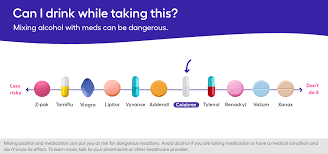Celebrex and Alcohol: Understanding the Risks
Celebrex, also known as celecoxib, is a nonsteroidal anti-inflammatory drug (NSAID) commonly prescribed for the treatment of pain, inflammation, and stiffness caused by conditions such as arthritis. While Celebrex can provide relief for these symptoms, it’s important to be aware of the potential risks associated with combining Celebrex with alcohol.
Alcohol consumption, when mixed with certain medications, can lead to adverse effects on your health. When it comes to Celebrex and alcohol, there are a few key considerations to keep in mind:
- Increased Risk of Stomach Irritation: Both Celebrex and alcohol have the potential to irritate the lining of your stomach. Combining the two can exacerbate this irritation and increase the risk of developing stomach ulcers or gastrointestinal bleeding. If you have a history of stomach issues or are prone to gastrointestinal problems, it is particularly important to exercise caution.
- Enhanced Drowsiness and Impaired Coordination: Alcohol is a central nervous system depressant that can cause drowsiness and impair coordination. When combined with Celebrex, which may also cause drowsiness as a side effect, these effects can be intensified. This combination may affect your ability to drive or operate machinery safely.
- Liver Function: Both Celebrex and alcohol are processed by the liver. Excessive alcohol consumption can strain the liver and potentially interfere with Celebrex’s metabolism. This interaction could impact how effectively Celebrex works in managing pain and inflammation.
- Increased Blood Pressure: Alcohol consumption can temporarily increase blood pressure levels in some individuals. If you are already at risk for high blood pressure or are taking medications to manage hypertension, combining alcohol with Celebrex may further elevate your blood pressure levels.
It’s essential to note that individual reactions may vary when combining Celebrex with alcohol. Factors such as dosage, frequency of alcohol consumption, overall health, and personal tolerance to both substances can influence the severity of potential interactions. Therefore, it is advisable to consult with your healthcare provider before consuming alcohol while taking Celebrex.
If you decide to consume alcohol while on Celebrex, it is crucial to do so in moderation. The Centers for Disease Control and Prevention (CDC) defines moderate drinking as up to one drink per day for women and up to two drinks per day for men.
In conclusion, combining Celebrex with alcohol can pose certain risks and may lead to adverse effects on your health. To ensure your well-being and minimize potential complications, it is always best to consult with your healthcare provider regarding the specific guidelines and precautions that apply to your situation. Your healthcare provider will be able to provide personalized advice based on your medical history and current medications, helping you make informed decisions regarding the use of Celebrex and alcohol.
Frequently Asked Questions about Celebrex and Alcohol: Answers to Your Concerns
- Can I drink alcohol with Celexa?
- What organ is Celebrex hard on?
- Is Celebrex hard on liver and kidneys?
- Can you drink alcohol on anti inflammatories?
- What should I avoid while taking Celebrex?
- How long can you safely stay on Celebrex?
Can I drink alcohol with Celexa?
Drinking alcohol while taking Celexa (citalopram) is generally not recommended. Celexa is a selective serotonin reuptake inhibitor (SSRI) commonly prescribed to treat depression and anxiety disorders. When alcohol and Celexa are combined, several potential risks and interactions may occur. It’s important to understand these implications before making any decisions.
- Increased Sedation: Both alcohol and Celexa can cause drowsiness and impair cognitive function. Combining them can intensify these effects, leading to excessive sedation, dizziness, and decreased alertness.
- Worsened Depression Symptoms: Alcohol is a depressant that can affect your mood. Consuming alcohol while being treated for depression with Celexa may counteract the medication’s positive effects and potentially worsen symptoms of depression.
- Interference with Medication Effectiveness: Alcohol can interfere with the effectiveness of antidepressant medications like Celexa. It may reduce the drug’s ability to alleviate symptoms or delay the onset of therapeutic benefits.
- Increased Risk of Side Effects: Both alcohol and Celexa have side effects that affect various bodily functions, such as coordination, judgment, and liver function. Combining them can increase the likelihood of experiencing side effects like dizziness, nausea, gastrointestinal issues, or liver problems.
- Potential Serotonin Syndrome: Serotonin syndrome is a rare but potentially life-threatening condition that can occur when there is an excess of serotonin in the brain. Mixing Celexa with alcohol increases the risk of developing this condition due to their combined impact on serotonin levels.
It’s crucial to consult your healthcare provider for personalized advice regarding alcohol consumption while taking Celexa. They will consider your specific medical history, dosage of medication, overall health status, and individual tolerance to both substances before providing guidance.
In general, it is advisable to avoid consuming alcohol while undergoing treatment with Celexa or any other antidepressant medication. If you do choose to drink alcohol, it is essential to do so in moderation and be aware of any adverse effects or changes in your mood or overall well-being. Open communication with your healthcare provider is key to ensuring the safest and most effective treatment for your condition.
What organ is Celebrex hard on?
Celebrex primarily affects the gastrointestinal system, particularly the stomach and intestines. Like other nonsteroidal anti-inflammatory drugs (NSAIDs), Celebrex can potentially cause irritation and damage to the lining of the stomach, leading to stomach ulcers or gastrointestinal bleeding. These risks are why it is important to take Celebrex as directed and avoid combining it with other substances, such as alcohol, that can further increase the likelihood of gastrointestinal issues. It is always recommended to consult with a healthcare provider for personalized information regarding the specific effects of Celebrex on your body and any potential risks involved.
Is Celebrex hard on liver and kidneys?
Celebrex, like other nonsteroidal anti-inflammatory drugs (NSAIDs), has the potential to affect the liver and kidneys. While it is generally considered to have a lower risk of causing liver damage compared to some other NSAIDs, it is still important to be aware of potential risks and take precautions.
Liver: Celebrex can cause elevated liver enzyme levels in some individuals. This is typically a reversible effect and does not necessarily indicate liver damage. However, in rare cases, severe liver injury can occur. It is crucial to monitor liver function regularly while taking Celebrex, especially if you have a history of liver disease or are taking other medications that may affect the liver.
Kidneys: Like many NSAIDs, Celebrex can potentially cause kidney problems, including reduced kidney function or fluid retention. Individuals with pre-existing kidney disease or those at risk for developing kidney issues should exercise caution when using Celebrex. It is important to stay adequately hydrated and monitor kidney function regularly.
To minimize the risk of adverse effects on the liver and kidneys while taking Celebrex:
- Follow the prescribed dosage: Take Celebrex exactly as directed by your healthcare provider. Do not exceed the recommended dose or duration of treatment.
- Regular monitoring: Your healthcare provider may order periodic blood tests to assess liver and kidney function while you are on Celebrex. These tests can help detect any potential issues early.
- Inform your healthcare provider: Make sure your healthcare provider is aware of any pre-existing conditions you have, including liver or kidney disease. They can help determine if Celebrex is suitable for you or suggest alternative treatments if necessary.
- Avoid alcohol and other medications: Alcohol consumption and certain medications (such as those that also affect the liver or kidneys) can increase the risk of adverse effects when combined with Celebrex. It’s important to discuss all medications and supplements you are taking with your healthcare provider.
As with any medication, it is crucial to discuss any concerns or questions you have about Celebrex’s potential effects on your liver and kidneys with your healthcare provider. They can provide personalized advice based on your specific medical history and help you make informed decisions regarding your treatment.
Can you drink alcohol on anti inflammatories?
It is generally not recommended to drink alcohol while taking anti-inflammatory medications. Alcohol can interact with these medications and potentially increase the risk of adverse effects. Here are a few reasons why it is advisable to avoid alcohol when on anti-inflammatories:
- Increased Risk of Stomach Irritation: Both alcohol and anti-inflammatory drugs can irritate the lining of the stomach, potentially leading to stomach ulcers or gastrointestinal bleeding. Combining the two substances can increase this risk.
- Liver Function: Anti-inflammatory medications are typically processed by the liver, as is alcohol. Consuming alcohol while taking these medications can put additional strain on the liver and may interfere with their metabolism, affecting their effectiveness.
- Enhanced Side Effects: Anti-inflammatory drugs may already have side effects such as drowsiness, dizziness, or impaired coordination. Alcohol can intensify these effects, making it unsafe to drive or operate machinery.
- Potential Interactions: Some anti-inflammatory medications may interact with alcohol in ways that could be harmful to your health. These interactions can vary depending on the specific medication you are taking, so it’s important to consult your healthcare provider for personalized advice.
While occasional and moderate alcohol consumption may not pose significant risks for everyone, it is always best to err on the side of caution and follow the guidance provided by your healthcare provider or pharmacist regarding alcohol use while taking anti-inflammatory medications.
Remember, if you have any concerns or questions about combining alcohol with your specific medication regimen, it is important to consult with your healthcare provider for personalized advice based on your medical history and current prescriptions.
What should I avoid while taking Celebrex?
While taking Celebrex (celecoxib), it’s important to be aware of certain precautions and potential interactions. Here are some things to avoid or be cautious about while taking Celebrex:
- Alcohol: As mentioned earlier, it is generally advisable to avoid or limit alcohol consumption while taking Celebrex. Combining alcohol with this medication can increase the risk of stomach irritation, gastrointestinal bleeding, drowsiness, impaired coordination, and potential liver complications.
- Other NSAIDs: It is recommended to avoid taking other nonsteroidal anti-inflammatory drugs (NSAIDs) such as ibuprofen or aspirin concurrently with Celebrex unless specifically instructed by your healthcare provider. Taking multiple NSAIDs simultaneously can increase the risk of side effects and may cause gastrointestinal issues.
- Blood Thinners: If you are taking blood thinners like warfarin or aspirin for certain medical conditions, it is important to inform your healthcare provider before starting Celebrex. Combining blood thinners with Celebrex may increase the risk of bleeding complications.
- Corticosteroids: Concurrent use of corticosteroids (such as prednisone) with Celebrex may elevate the risk of gastrointestinal ulcers and bleeding.
- Selective Serotonin Reuptake Inhibitors (SSRIs): If you are taking SSRIs for conditions like depression or anxiety, it’s important to discuss this with your healthcare provider before starting Celebrex. The combination of SSRIs and NSAIDs can occasionally increase the risk of gastrointestinal bleeding.
- Kidney Function: Since Celebrex is processed by the kidneys, individuals with pre-existing kidney problems should exercise caution while using this medication. It’s essential to consult your healthcare provider if you have any kidney-related concerns or if you are taking other medications that may affect kidney function.
- Allergies: If you have a known allergy or hypersensitivity to Celebrex or any other NSAIDs, it is crucial to avoid using this medication and inform your healthcare provider immediately.
Always follow the instructions provided by your healthcare provider and read the medication’s label carefully. If you have any questions or concerns about potential interactions or precautions while taking Celebrex, it’s best to consult with your healthcare provider for personalized advice based on your specific medical history and current medications.
How long can you safely stay on Celebrex?
The duration for which it is safe to stay on Celebrex (celecoxib) can vary depending on several factors, including the individual’s medical condition, overall health, and response to the medication. Celebrex is typically prescribed for the short-term management of pain and inflammation associated with conditions such as arthritis. However, in certain cases, it may be used for longer periods under medical supervision.
It is important to follow the guidance provided by your healthcare provider regarding the duration of Celebrex treatment. They will consider various factors such as the severity of your condition, other medications you may be taking, and any underlying health conditions you have.
Long-term use of Celebrex or any NSAID carries potential risks, including an increased likelihood of gastrointestinal side effects such as stomach ulcers and bleeding. To minimize these risks, doctors often prescribe the lowest effective dose for the shortest duration necessary to manage symptoms.
Regular check-ups with your healthcare provider are essential when taking Celebrex long-term. They can assess your response to the medication, monitor any potential side effects or complications, and adjust your treatment plan accordingly.
Never stop or modify your Celebrex treatment without consulting your healthcare provider first. Abruptly discontinuing NSAIDs like Celebrex can have adverse effects on your health and may worsen pain or inflammation.
Always communicate openly with your healthcare provider about any concerns or questions you may have regarding the duration of Celebrex treatment. They are best equipped to provide personalized advice based on your specific circumstances and medical history.





You actually make it seem really easy together with your presentation but I to
find this topic to be actually one thing which I feel I’d never understand.
It kind of feels too complicated and very wide for me.
I am having a look forward to your next publish, I’ll try to get the grasp of
it! Lista escape roomów
Thank you for sharing your thoughts. Understanding the potential risks associated with combining medications like Celebrex with alcohol can indeed be complex. It’s always important to seek guidance from healthcare professionals to ensure your well-being and make informed decisions regarding your health. If you have any specific concerns or questions, consulting with your healthcare provider would be beneficial. Thank you for your interest, and we appreciate your feedback.